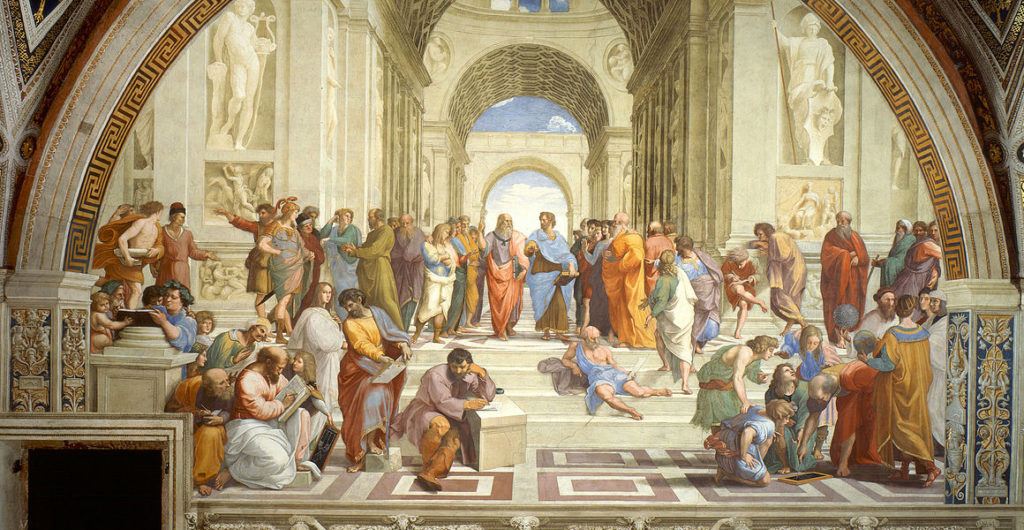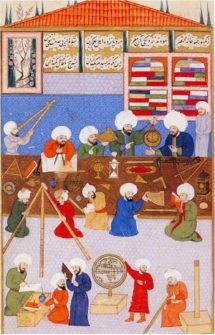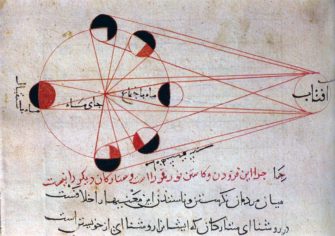
Have you ever wondered how your everyday Muslim connects with the Islamic tradition today? The connection takes place as it always has: at the feet of scholars. More precisely, it happens in air-conditioned auditoriums at knowledge retreats in universities and hotels around the world. These gatherings typically consist of teachings in Islamic jurisprudence, ethics, and theology, offering theories of the soul, temperaments and humors, and virtue ethics that originate in ancient Hellenistic philosophy.
However, these teachings are credited to scholars like Raghib al-Isfahani and Abu Hamid al-Ghazali instead of Aristotle or Plato. This is because by the eleventh century of the Common Era, ancient learning had been completely assimilated into Islamic thought. So deep and thorough was the influence of Greek, Indian, and Persian communities on Islamic intellectual and political life that the different strands became virtually indistinguishable.

The fusion of “foreign” learning with Arabic revelation in the formation of classical Islamic thought cannot be overstated. It is vital to recognize the debt to foreign influences for two reasons: 1) it precludes naïve and even irresponsible appeals to adhere to some kind of “pure” Islam that existed in the past, and 2) it encourages openness in religious thought that is necessary for religion’s continued relevance through changing times. If the essence of “tradition” is to be found not in its content but in its dynamism, then fealty to tradition can be redefined, shifting it from an emphasis on “transmission” to an emphasis on “openness” to new ideas.
The Templeton-funded project to “advance theological and scientific literacy in madrasa discourses” is designed to bring about this very shift. Tradition, we argue, is not the mere repetition of the creativity of past scholars. Tradition is active participation in ongoing creative syntheses, keeping in mind shifts in human understanding. The project is guided by an “elicitive” pedagogical method that draws on resources that are already present in Islamic thought. The purpose of an elicitive approach is to preserve authenticity and legitimacy: the encounter with new knowledge comes as an extension of, rather than rupture with, the inherited Islamic scholarly tradition.
Throughout the course of human history, philosophers, scientists, and mystics have offered competing cosmologies to describe the universe we inhabit and experience. Before the mesmerizing advance of science and technology that we see today, competing views of the structure and composition of the universe could not only be internally coherent but also equally good at explaining things around us. Today, premodern cosmologies must contend with the reality of modern science if they are to remain relevant. This does not mean that everyone must become a materialist or succumb to scientism; however, it does mean that the knowledge systems and philsophical presuppositions that propel and sustain science must be intelligently grappled with.
Take the following as an example of unintelligent grappling. In one of my undergraduate courses, we read Rachel Carson’s argument against the use of pesticides. Reading from one of her environmental essays in Silent Spring, an eager student quickly bought her argument hook, line, and sinker. He proceeded to extend Carson’s compelling argument in our classroom discussion without realizing that it relies on the scientific theory of biological evolution. When I asked the student what he thought of that, he was taken aback because, as a traditional Muslim, he had not yet come to terms with evolution.
This kind of an incoherent intellectual framework is neither compelling nor sustainable. It will not only continue to alienate future generations of thinking Muslims from their tradition, it will also keep Muslim thought ossified and irrelevant in the modern world. One of my Quran teachers used to love to repeat this story: “Once I asked a colleague of mine—who was a medical doctor—what he thought about evolution. He replied without batting an eye: ‘Why, it’s disbelief!’ When I told him I was not seeking a fatwa but rather a scientific perspective, he changed his tune: ‘Well, the evidence is very compelling!’” (I can still hear the story in an endearing lilting South Asian English accent!)
If Islam is to thrive as a religious and intellectual tradition that cultivates healthy individuals and communities in the age of modern techno-science, it is imperative for traditional Muslim theology to come to terms with the ontological worldview, epistemological assumptions, and sociological implications of modern science. This does not mean that Muslim theology should surrender unconditionally to science’s terms. It does mean, however, that Muslim thought needs to understand and contend with these terms with integrity and sophistication, not with off-hand dismissal or asystematic appropriation. I suspect that real intellectual engagement will lead to new syntheses in a creative process of knowledge assimilation and appropriation which was a hallmark of the classical Islamic scholarly tradition.
An exemplar for the “madrasa discourses” project is none other than the celebrated Ghazali, mentioned above. In his reflections on his own intellectual journey as recorded in his autobiographical Deliverance from Error, Ghazali lambasts the religious fool who refutes his intellectual opponent with strawman arguments or with naïve understandings of his own tradition. Ebrahim Moosa, Professor of Islamic Studies at the Kroc Institute for International Peace Studies, draws inspiration from Ghazali in his work on Ghazali and the Poetics of Imagination: “Frustrated by the violation of common sense demonstrated by some implacable theologians, Ghazali reminds us of the wise dictum that ‘a rational foe is better than an ignorant friend.’ With bruising sarcasm, he said elsewhere: ‘To shun an ignoramous is to make an offering to God!’” (p. 181). An essential prerequisite to critique, says Ghazali, is to first not only understand but also to articulate the opposing point of view sympathetically. Ghazali, who has been widely recognized as an intellectual “renewer” of tradition, serves as a model for us in this respect.

The notion that tradition needs constant updating or renewal is embedded within Islamic teachings, and it fits right in with our elicitive pedagogical approach. Renewal takes place when two sources of knowledge—of the world and of scripture—collide. There is only one requisite for the success of an endeavor that brings different intellectual systems into conversation: the use of common terms that are intelligible to both. As in the case of translation from one language to another, seamless communication is only possible when another language is mastered. In our case, the language that madrasa graduates must begin to learn is the language of modern science and contemporary academic frames for the study of nature, society, and history.
Our hope is that the intimate intellectual encounter that we facilitate will lead to greater respect, understanding, and even trust, across cultures and civilizations. Trust lays the foundation for mutual enrichment, reconciliation, and enduring peace. Given that the intellectual heritage of Catholicism shares so much in common with the Islamic past, as children of both Abraham and Aristotle, it is no coincidence that a project of this kind is located at the University of Notre Dame, one of the world’s premier Catholic institutions of higher learning.

